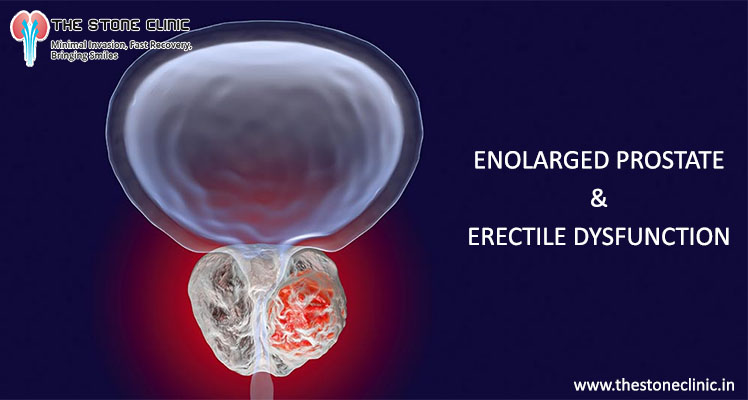The relationship between an enlarged prostate (called Benign Prostate Hyperplasia – BPH) and erectile dysfunction (sexual impotence) is one of the topics that raises more questions and uncertainties.
After all, one thing is certain: both problems affect the quality of life of patients, so their combination results in even greater concern.
However, over time, several myths emerged about this relationship that it is important to clarify.
What is Benign Prostate Hyperplasia?
This is a pathology that is characterized by an increase in the number of prostate cells, resulting in an increase in its volume and size. This change occurs especially in a region called the transition zone, around the urethra.
In general, the incidence of this problem tends to increase with age: it is estimated that it affects around 20% of men over 40 years of age and one in three over 65 years of age.
Among the main risk factors that seem to increase the probability of developing a benign prostate growth is testosterone, which is responsible for cell proliferation in this organ that causes the pathology, explains the best urologist in Pitampura.
Main Symptoms of BPH
As the increase in volume develops mainly around the urethra, causing its compression, it is common for some urinary complaints to appear, known as LUTS (Lower Urinary Tract Symptoms, which means Lower Urinary Tract Symptoms).
Some of the most common symptoms are:
- Decreased urinary stream;
- Inability to urinate;
- uncomfortable or painful urination;
- Frequent feeling of a full bladder;
- Urinary incontinence (inability to retain urine).
What is Erectile Dysfunction (Sexual Impotence)?
Erectile dysfunction is often known as impotence, which is characterized by the inability to initiate or maintain an erection strong enough for satisfactory sexual intercourse, explains the sexologist in Rohini.
As there is often a lot of shame in admitting this problem, the truth is that this problem is much more common than you think.
Having difficulty getting an erection is natural at some point in life, for both younger and older men – so it doesn’t necessarily mean there is a problem.
However, when it occurs frequently it is important to understand the reason so that the condition can be resolved.
Despite being a non-life-threatening disorder, in most cases it has undesirable consequences for many men: it affects not only their personal and sexual life, but also their self-image and self-esteem, negatively influencing interpersonal relationships, states the sexologist in Pitampura.
What is the relationship between BPH and Erectile Dysfunction?
There are several myths that associate the prostate and its function with the ability to erection – and they are not true.
In fact, they represent different mechanisms: the prostate plays a fundamental role in the ejaculation process but not in the erection process.
Male sexual function depends on the normal interaction between the following systems:
- hormonal;
- Neurological;
- Vascular (arterial and venous);
- Psychological.
So, a change in any one of them can cause some sort of dysfunction, resulting in impotence.
Although some prostate diseases can interfere with sexuality, they usually do not represent direct causes.
An enlarged prostate by itself does not cause impotence, unless there is compression of the nerves responsible for an erection. Some of the treatments for diseases of this organ, however, can cause impotence, explains the Best Urologist in Delhi.
What Treatments Can Cause Erectile Dysfunction?
BPH is a pathology for which, nowadays, there is a wide variety of therapies that, although they resolve the condition, may have some sexual side effects, namely in terms of the ability to erection.
Furthermore, they can also affect libido (sexual desire) as well as the ejaculation mechanism.
Medical therapy is one of the treatments with the most side effects of this type, especially 5 alpha-reductase inhibitors (finasteride and dutasteride).
- Finasteride was associated with erectile dysfunction in a high percentage of treated men, so they are not first-line drugs for BPH.
- Alpha-blockers can decrease the volume of ejaculated sperm.
As for prostate surgery in Pitampura, whether open or endoscopic, they present very rare risks of erectile dysfunction, although they carry risks in terms of ejaculation.
Early Diagnosis and Expert Counselling
Prostate treatment in Pitampura for an enlarged prostate can increase the risk of impotence.
Even so, it is sometimes possible to avoid these consequences thanks to an early diagnosis.
When it is discovered at an early stage, it may not even be necessary to resort to medical or surgical therapies, but to actively monitor the evolution of the disease.
This is an attempt to reduce the risk of developing sexual consequences from the treatments carried out.
But the first step is up to you.
Look for a specialist urologist in Delhi to have complete and personalized advice, which will show you the most favorable path to follow.

Comments
Post a Comment